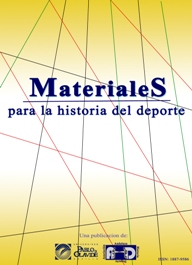Sport and national identity in Brazil: negotiation around four idols
Keywords:
sport and society, sport heroes, national identity, Brazil.Abstract
Sport, one of the important leitmotivs of modernity, is in centre of the national identities construction. In Brazil it is not different, and there are several examples of the relationship between sport and the construction of identities, especially after the second half of last (short) century. In this paper are presented some aspects of the construction of the national identity through sport, studying the imaginary concerning four Brazilian “national heroes”: the soccer player Pelé, the chess player Mequinho, the driver Ayrton Senna and the tennis player Gustavo Kuerten. For so much we have selected and analysed reports, chronicles and headlines of Brazilians daily newspapers and weekly magazines in several periods between 1970 and 2000. The results suggest important differences in the construction of each one of the “heroes”: Pelé as the black people's representative in a racist country; Mequinho as “the brain of nation”; Senna as the man who dominates the machine; Kuerten represents, however, the image of a “good boy” of fair play. These “heroes” and their mythological images, in spite of their contradictions, seem to be reconciled in the social imaginary that represents Brazilian identity also in other social fields beyond sports.
Downloads
References
Archetti, Eduardo. Argentinien. In: Eisenberg, Christiane. Fußball, soccer, calcio. Ein englischer Sport auf seinem Weg um die Welt. München: DTV, 1997a, p. 149-170.
Archetti, Eduardo. The moralities of Argentinian football. In: Howell, Signe. The Ethnography of Moralities. London und New York: Routledge, 1997b, p. 99-123.
Archetti, Eduardo. El potremo y el pibe. Territorio y pertenencia en el imaginafio del fútbol argentino. Nueva Sociedad, Caracas, 03/04/1998, p. 101-119.
Archetti, Eduardo. El potremo, la pista y el ring. Las patrias del deporte argentino. Buenos Aires: Fondo de Cultura Economica, 2001.
BARTHOLO, Tiago Lisboa; SOARES, Antonio Jorge Gonçalves; SALVADOR, Marcos Antonio Santoro. O "futebol arte" e o "planejamento México" na Copa de 70: as memórias de Lamartine Pereira Da Costa. Movimento. Porto Alegre, v. 10, n. 3, p. 113-130, 2004.
BARTHOLO, Tiago Lisboa; SOARES, Antonio Jorge Gonçalves. Identidade, negócio, esporte no mundo globalizado: o conflito entre Guga e os patrocinadores na Olimpíada de Sydney. Revista Brasileira de Ciências do Esporte. Campinhas, v. 28, p. 55-72, 2006.
Carvalho, José Murilo de. Os bestializados: o Rio de Janeiro e a república que não foi. 2. ed. Sao Paulo: Companhia das Letras, 1987.
Carvalho, José Murilo de. A formação das almas: o imaginário da república no Brasil. São Paulo: Companhia das Letras, 1995.
Chaui, Marilena. Conformismo e resistência: aspectos da cultura popular no Brasil. São Paulo: Brasiliense, 1993.
Coelho, Marcelo. Negra é a cor do nacionalismo brasileiro: Morte de Ayrton Senna permite que os cidadãos se reúnam em torno da idéia de um Brasil trágico. Folha de São Paulo, p. 5-8, 04/05/1994.
DaMatta, Roberto. Esporte na sociedade: um ensaio sobre o futebol brasileiro. In: DaMatta, Roberto (Org.). Universo do futebol. Rio de Janeiro: Pinakotek, 1982.
DaMatta, Roberto. Antropologia do óbvio. São Paulo, Revista USP. n. 22, p. 10-17, jun/jul/ago 1994.
DaMatta, Roberto. Vitória na Copa não terá dono. Rio de Janeiro, Jornal do Brasil, p. 10, 14.06.1998.
DaMatta. Guga por DaMatta. http://www.no.com.br/servlets/newstorm.notitia.apresentacao.ServletDeNoticia?codigoDaNoticia=4739&dataDoJornal=962652308000 (2000, 27.11.2001).
Fatheuer, Thomas. Das Vaterland der Fußballschuhe. Eine kleine Sozialgeschichte des brasilianischen Fußballs. Bad Honnef, Lateinamerika. n. 19, 1995, p. 21-37.
Gastaldo, Édison Luís. “Os Campeões do Século”: notas sobre a definição da realidade no futebol-espetáculo. Revista Brasileira de Ciências do Esporte. Vol. 22, n. 1, setembro 2000. p. 105-124.
Hobsbawm, Eric. Era dos extremos: o breve século XX 1914-1991. São Paulo: Companhia das Letras, 1998.
Landau, Elena. Guga é Senna. http://www.no.com.br/revista/secaoparaimpressao/1954/33245/999831688000 (2001, 17/04/2002)
Maradona, Diego. Yo soy el Diego de la gente. Buenos Aires: Planeta 2000.
Rocha, Everardo. As invenções do cotidiano: o descobrimento do Brasil e a conquista do tetra. Rio de
Janeiro, Cadernos de Campo. n. 3 e 4, S. 9-20, 1996.
Sá, Nelson. Orgulho Nacional. Folha de São Paulo, p. 3-4, 10/06/1997.
Soares, Antônio Jorge. História e invenção de tradições no futebol brasileiro. Estudos Históricos. Vol. 13, n. 23, 1999, p. 119-146.
Sevcenko, Nicolau.Orfeu extático da metrópole. São Paulo: Companhia das Letras, 1992.
Sevcenko, Nicolau. A corrida para o século XXI: no loop da montanha russa. São Paulo: Companhia das Letras, 2001.
FONTES
Estado de São Paulo
Folha de São Paulo
Placar
Veja
Downloads
Published
Issue
Section
License
Authors who submit to this journal agree to the following terms:
- Author(s) keep copyright and guarantee to the journal the right to be the first publication of the work as licensed under Creative Commons Attribution-Noncommercial-ShareAlike 4.0 International as initial publication in this journal.
- Author(s) can establish additional agreements for non-exclusive distribution of the version of the work published in the journal (for example, to an institutional archives or to publish it in a book), with an acknowledgment of its initial publication in this journal.
- It is allowed and authors are encouraged to disseminate their work electronically (e.g, in institutional open archives or on their own website) before and during the submission process, as it can lead to productive exchanges, as well as a citation earlier and more of published work (See the Effect of Open Access).










